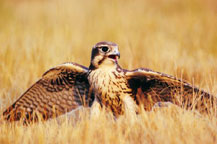
Our Klamath Basin Water Crisis
Upholding rural Americans' rights to grow food,
own property, and caretake our wildlife and natural resources.

Our Klamath Basin
Water Crisis
Upholding rural Americans' rights to grow food,
own property, and caretake our wildlife and natural resources.
Haying for the
Birds
|
 |
We started cutting second and the dews had been heavy. I pushed my luck that morning trying to start too early, and ended up plugging the header so tight it took almost an hour to clear it. By the time I finished, the hay was almost dry enough to give it another try. But not quite. |
I sat back on a tire and opened a bag of peanuts, looking out across the 50-acre field I would, God willing, finish by tonight. Then, suddenly, right over my head, there was an eruption of hawk-screech and flapping. I looked up and a pair of redtails were getting into it with a big rough-legged hawk, which had just shown up last week with a bunch of his friends from the north.
Here in the Klamath Basin we're getting near the southern end of the rough-legged's range. They nest up near the Arctic Circle, and then gradually work their way down here to spend the winter. The redtails, which have been here all summer, don't seem to appreciate their arrival and make no bones about it. But they are no match for the newcomers, and usually have to give up their prime hunting perches, and sometimes much more than that. It doesn't seem fair, but fair ain't what nature's about, is it?
I looked around the perimeter of the field, and there wasn't a single perchable spot that didn't have some kind of a bird on it. We have a single cottonwood tree out in front of the house, about a hundred years old, with only the bottom half growing. The top half is all dead branches reaching a hundred feet in the air. In the tree that morning were two redtails, three rough-leggeds, a kestrel, and three bald eagles, two of them immature. The eagles nest up on our dryland, and bring young down into the flats each and every year.
Every power pole had some kind of raptor on it. One had a prairie falcon. The wheel lines were studded with ravens, magpies, and Lord knows how many little flitting songbirds. The cut part of the field was speckled with seagulls, that miraculous bird with the magical ability to materialize out of thin air the instant any farmer pulls out into a field dragging something behind him.
As I sat there one thing became abundantly clear: those birds were waiting for me. They knew that pretty soon that flightless two-legged clodhopper would disappear into that rumbling contraption, and with every pass leave a feast in his wake. These wild creatures knew ahead of time that this obnoxious industrial machinery could very well mean the difference between life and death, either for them or for their hungry young.
And of course we can't forget the squirrels and the mice and the gophers and the voles, which are part of this landscape too, and which very likely do not see the coming of the haymaker as something they should celebrate. It is, after all, their carcasses that those majestic raptors are waiting for. I suppose it doesn't seem fair to a rodent, but like I said, fair ain't what nature's about.
Working these fields day in and day out; watching the wildlife coming and going; watching things live and watching things die; watching things live precisely because some other things die; watching things die apparently for no other reason except to make new life possible-watching all these things, you become aware of being part of something much bigger than just yourself, something that doesn't always fit neatly into our expectations of how things "should be."
There is a word for this sort of feeling. It's called humility, and it is something that has been sorely lacking in the debate over the basin's natural resource issues. This really came home to me last week, as I listened to environmental activists-I am not making this up-publicly opposing collaborative, community-based ecosystem restoration, for no other reason except that it wasn't their idea, and they are not in control of the process.
As we do this difficult daily work, perhaps we could draw strength from words like these, from the farmer/poet Wendell Berry:
All goes back to earth
and so I do not desire
pride of excess or power,
but the contentments made
by men who have had little:
the fisherman's silence
receiving the river's grace,
the farmer's musing on rows.
God bless the good people in this basin who, in spite of the professional cynics, are working together to create enduring local solutions to our water problems. May they have patience and faith, and know that theirs is the only kind of effort that has ever resulted in any enduring change in this world. *
Mike Connelly is a federal lands rancher, a writer, and federal project irrigator in Klamath County, Ore.
Home
Page Updated: Thursday May 07, 2009 09:15 AM Pacific
Copyright © klamathbasincrisis.org, 2004, All Rights Reserved